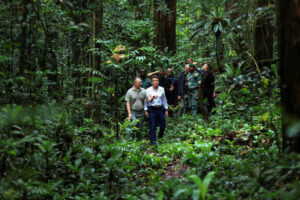
March 19 – The world’s natural capital, on which humanity depends, has been steadily declining while human, physical and financial capital have risen manifold over the past 50 years. Sir Partha Dasgupta, author of The Economics of Biodiversity, has argued that the world has collectively mismanaged its “global portfolio of assets”. And this mismanagement, according to World Economic Forum research, has put more than half of the world’s GDP at risk due to its high dependency on biodiversity and ecosystem services. Why, then, are we failing to value nature and reward those who protect it?
One reason is that we have prioritised engineering solutions over nature-based solutions. Nature can provide a third of climate mitigation potential and yet receives less than 3% of total climate finance. The situation is even more dire when it comes to climate adaptation, where less than 10% of funding in the least-developed nations harnesses nature. Moreover, we have equated climate change with counting carbon emissions, limiting our ability to address the intertwined crises of biodiversity loss and pollution. Lastly, the carbon market playbook does not work for valuing and investing in standing forests and pristine seas.
